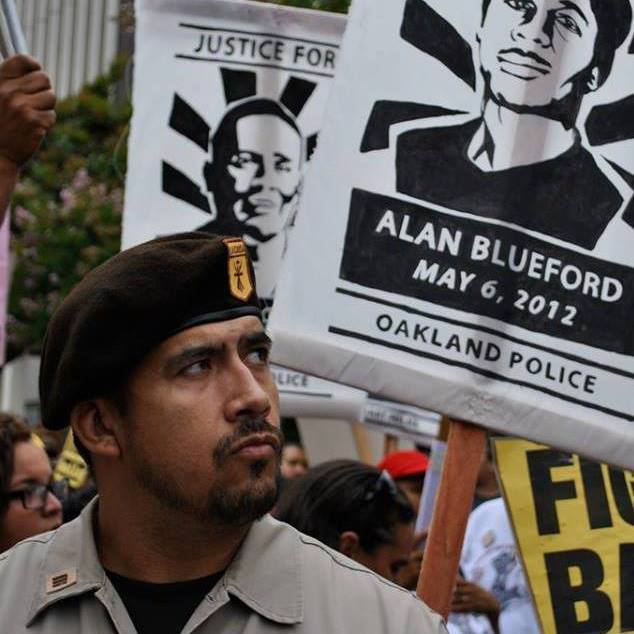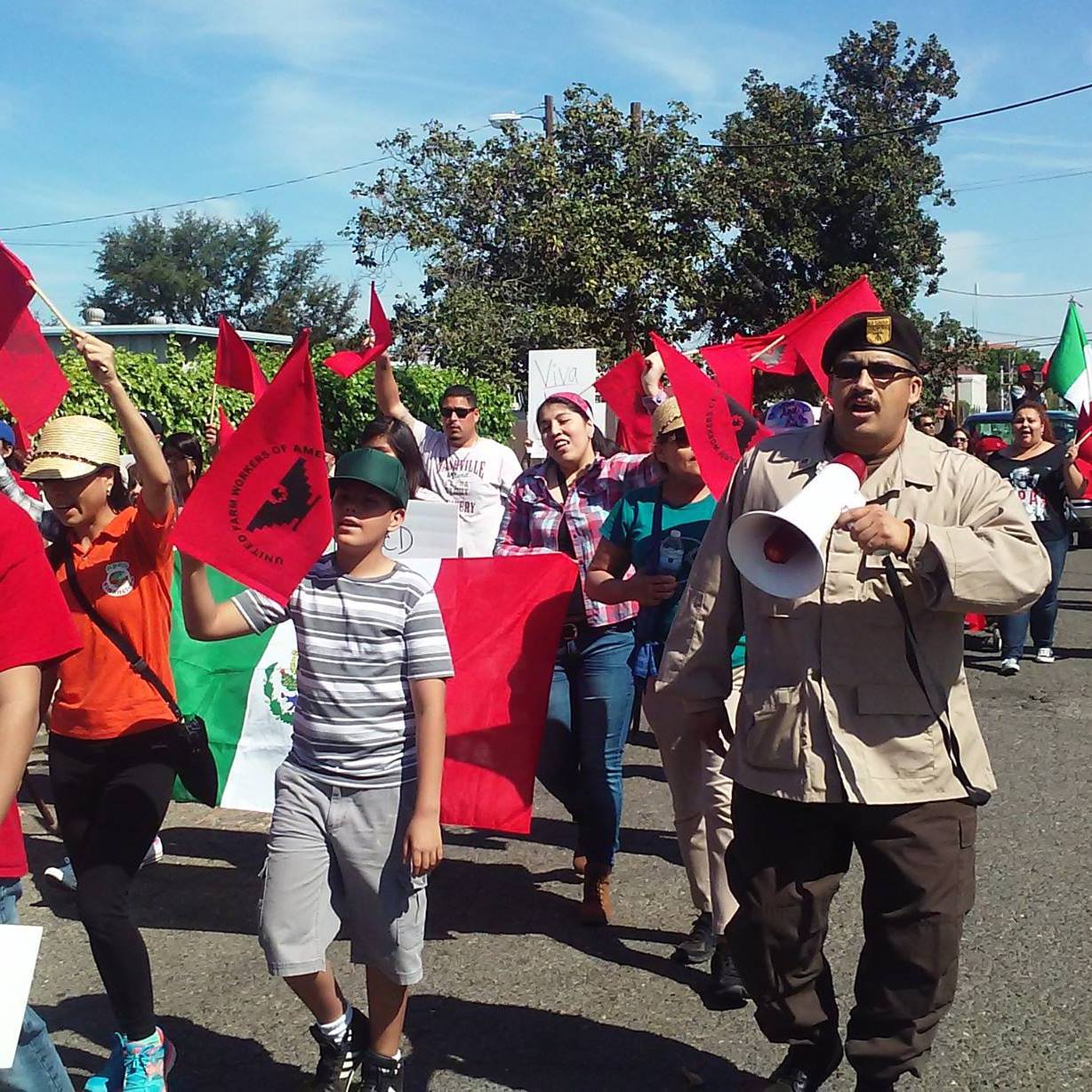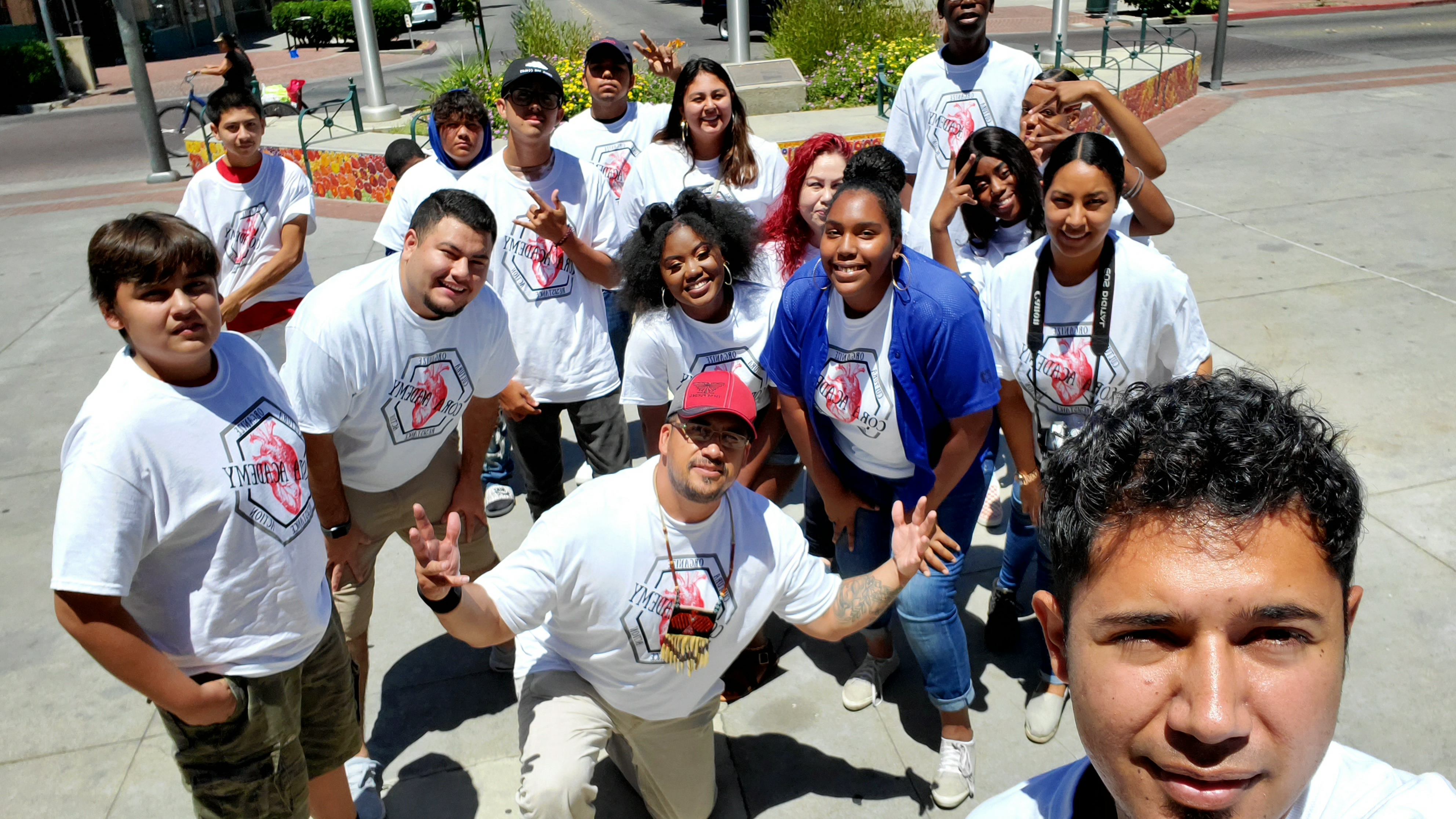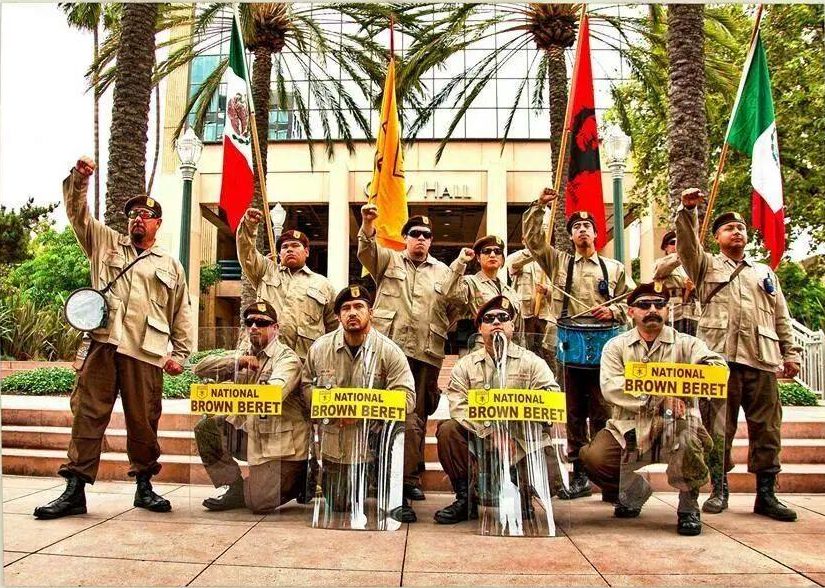
I am coming to yli from a deeply radical background. I was second-in-command with the National Brown Berets for several years, a militant Chicano nationalist organization similar to the Black Panthers that fights for the safety, security and wellbeing of our barrio – our community. My focus was on building the anti-police terror movement – the Merced Sun-Star wrote this article about our work in Merced. Our strategies were direct actions: we took up space, we were loud and proud, we put our bodies on the line to make sure our families – especially those who had lost loved ones at the hands of police – were safe from police brutality and could speak their minds in the pursuit of justice.
I have a strong sense of cultural identity, of pride and tradition. I’m very vocal.
As co-founder of Merced’s Brown Berets chapter, I’ve spoken many times at City Council, before the Board of Supervisors, and at town halls about how young people are being impacted by policies. This caught the attention of local funders, who reached out to me and my comrade, Claudia, to bring youth into this work. They connected us with yli – one of their grantees – to hire us and open an office in Merced.
Merced is a deeply conservative place. We call it “Central Calibama” because it is a stronghold for white supremacy and Trump supporters who don’t respect people of color or young people. Direct action is how you get results here, and our recent campaigns demonstrate that. The Girls and Women of Color (GWoC), a group of youth that Claudia leads, have really shown out – their presence is known. They played a key role in the #MErcedTOO Campaign, which addressed sexual harassment in our schools. When Claudia walks in the room, the people in power know she means business.

When we were hired by yli, we assumed that we would be able to continue the work that we were doing, in the way that we were doing it. But these strategies haven’t always aligned with the “yli way.” From the start, my team and I have had to navigate between the “yli style” – the “inside-outside” strategy – and the style that has been productive for us in Merced.
This style requires that we sit down with elected officials who don’t see youth of color as a valuable resource. Claudia and I have taken over City Council meetings, charging in with 150 people to ensure that our voices were heard. But now we can’t upset people, we have to worry about what our partners are going to think. Our tactics included protests, rallies, crashing meetings, and other methods that put the pain of oppression in the face of our elected officials. Now we are having to use some finesse.
There are pressing needs in our community, but, with a scope of work to fulfill, we can’t be as responsive to these needs as we were before. Our contracts are tied to health equity – tobacco, alcohol, cannabis. These are important – I know substance abuse is deteriorating the lives of young people, and policy work is one way to address it. But we need to stay grounded in the root causes. Our youth face violence at home, poverty, white supremacy. They come from single parent homes, they lack healthy male role models.
Our work sometimes feels too transactional – we’re so focused on policy change and getting the “win.”
Is this how we are measuring success? It feels corporate when our success is charted by numbers in our annual report, by “outcomes” that we can demonstrate to our funders. At some point, we need to make sure that our young people are being transformed – this should be the heart of our work.
It’s easy for me to identify high-achieving young people to do this work – young folks who are probably already going to go to college and make the move up to middle class life. But my concern is for the young people who are the most impacted: formerly incarcerated youth, foster youth, and displaced youth. Sometimes I find myself trying to share yli’s hopeful message of political empowerment and I feel like a used car salesman. They have never been taught that there are social conditions that are contributing to their struggles. They are fed a message from society that they are struggling because they are insufficient in some way.

My youth have a different starting point. The trauma they have experienced hasn’t allowed them to be vocal, to be brave. Our funding allows me to lead healing circles, but they need more. They need to connect to their elders, to be exposed to decolonized culture and tradition. I use my own resources to make this medicine available to them. When they’re ready, they can move to external actions like policy work. It takes longer, but if we focus on transformation, it will pay off in the long run.
Our ultimate goal as an organization should be to make ourselves obsolete – if we truly do the work of transforming and empowering our communities, they will no longer need us.
To some folks who have remained in the militant part of the movement, I’m considered a sell-out for joining a nonprofit – and sometimes I feel like one. When there’s money involved – especially the type of money and partnerships that we have at yli – there’s danger of being compromised. Many foundations have money to give us because they have profited off of people of color and the poor. If I’m not spiritually sound and fit, if I’m not taking care of myself, this aspect of my work can destroy who I am inside.
Right now, I don’t have the privilege to be my full radical self. I have family, I have responsibilities, and yli pays the bills. I have to make compromises with a philosophy that was handed down to me by the innovators of the movement: elders of the Black Panthers, indigenous peoples, and Brown Berets.
What I do to fulfill that part of me is to belong to other organizations, activities that are outside of funded work. I continue to be part of radical movements that combat white supremacy and capitalism, like the Black Berets for Social Justice. Our focus is to protect our Indigenous ceremonies and the people who are pursuing justice. I donate resources that I get from yli to those causes – I know I’m not the only one at yli who does that. I’m doing my best to “walk the walk” by being a conduit of resources from the nonprofit industrial complex to the more radical organizations.

I’m seeing change within yli as well, which gives me hope. When I hear from other staff that they share my sentiments, when I see yli having these conversations about radicalism, that conversation comes to mind, and I feel hopeful that things are changing. We have to be more radical because oppression is growing. If we want to stay relevant in the youth movement, we can’t only do the safe work – we have to go to the source of the oppression.
Obviously, there is a lot more we could do to decolonize our work. I was second in command of a really big organization, and I found hierarchy to be very problematic – hierarchies hurt people. When I pushed for shared leadership, I got a lot of pushback and ended up stepping down. I didn’t want to be at the top of the pyramid.
I’m really inspired by the organization MILPA in Salinas, CA. They have successfully decolonized their work by getting rid of the hierarchy. Everyone’s role is of equal value and they approach their organization like a village. Because of that, they have created true change in the larger community’s quality of life.
I think yli needs to start de-assimilating from how organizations are currently structured through hierarchy. I also would like to see us doing more statewide work around mass incarceration and community violence through a public health lens. We’re doing that work in Fresno and Merced, but we don’t yet have the resources to bring our young people to Sacramento to advocate on a regular basis.
For me and for other people I’m close to, the goal is liberation – freedom from the system that is trying to destroy us native people and people of color.
The battle is taking place on many fronts, and right now, my fight is to extract resources from within the system. We need to figure out a way to work within the beast – not with the beast – to ensure that our young people have the resources they need to survive.
I’m all in, I’m not going anywhere. I believe in yli’s leadership – that people really care for each other. If we’re leading with love – what’s more radical than love?
This post is the third in our series, “Is yli Radical Enough?” At yli, we have strong opinions about what social justice looks like…but are we truly living our values? We have the power to be intentional about our work community and model what it looks like for an organization to work at self-reflection and improvement. This is an attempt to be vulnerable and transparent about our process of growth as individuals, as a collective, and as youth advocates.
